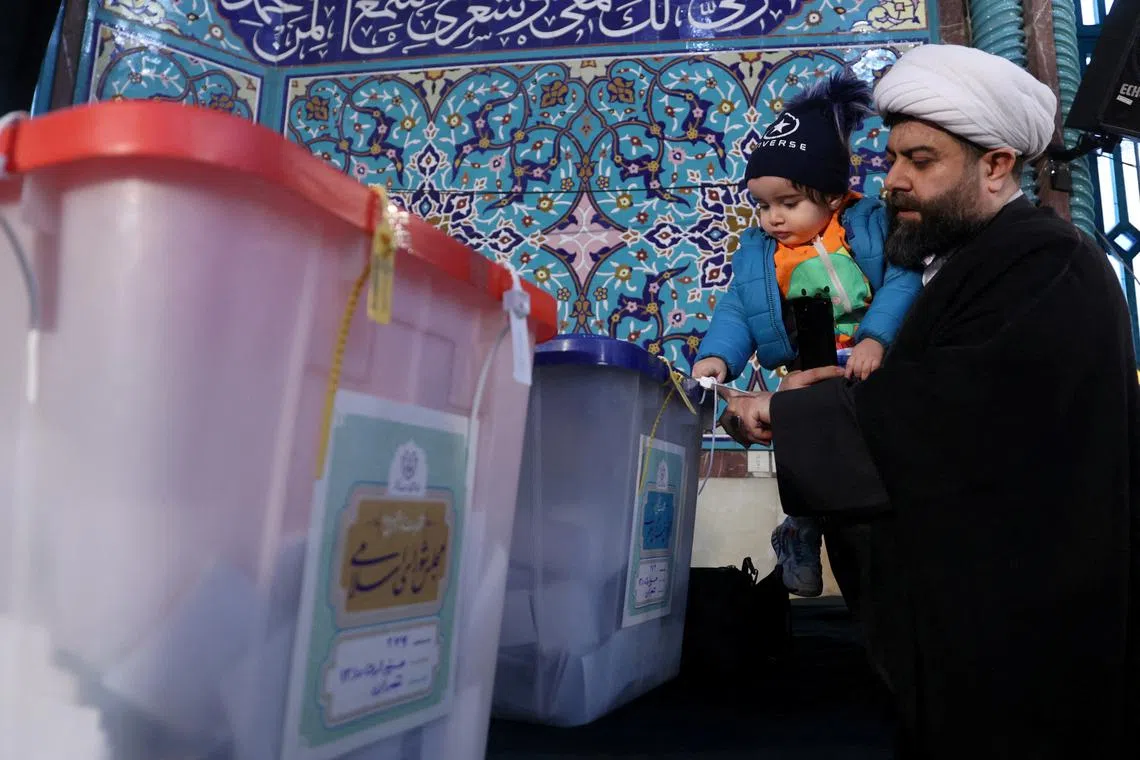Iran conservatives secure bulk of seats in elections: Media
Sign up now: Get ST's newsletters delivered to your inbox

The official IRNA news agency put the turnout for the March 1 polls at around "41 per cent".
PHOTO: REUTERS
TEHERAN - Iranian conservatives secured the bulk of seats in elections for a key clerical body and the national legislature, local media reported on March 3, estimating a record low turnout.
Authorities were still counting ballots two days after the vote on March 1 for members of Parliament and for the Assembly of Experts, which selects the Islamic republic’s supreme leader.
The vote was the first since protests broke out over the September 2022 death of Mahsa Amini
The election, in which a vetting process barred many hopefuls from running, took place with Iran suffering a severe economic crisis deepened by international sanctions.
The official IRNA news agency put the turnout at around “41 per cent” among 61 million eligible voters. No official figure had yet been announced.
If the turnout figure is confirmed, it would be the lowest since Iran's Islamic revolution in 1979.
Iran's turnout fell to 42.5 per cent in 2020 parliamentary elections from about 62 per cent in 2016.
High-profile moderates and conservatives stayed away from the elections on March 1. Reformists called it neither free nor fair as it was mainly a contest between hardliners and low-key conservatives loyal to Islamic revolutionary ideals.
Mr Mohammad Khatami, Iran's first reformist president, was among critics who did not vote on March 1.
Imprisoned Nobel Peace Prize laureate Narges Mohammadi, a women's rights advocate, in a statement shared by her family with Reuters, called the election a "sham".
Iran’s Supreme Leader Ayatollah Ali Khamenei accused Iran's "enemies" - a term he normally uses for the United States and Israel - of trying to create despair among Iranian voters.
Over 15,000 candidates ran for the 290-seat parliament on March 1. The poll was twinned with a vote for the 88-seat Assembly of Experts, an influential body that has the task of choosing 84-year-old Khamenei's successor.
Hardline President Ebrahim Raisi was re-elected to the Assembly of Experts with 82.5 per cent of the vote, the interior ministry announced on March 2.
Mr Hassan Rouhani, a pragmatist who was elected president in landslide wins in 2013 and 2017 promising to reduce Iran's diplomatic isolation, was banned from running, drawing criticism from moderates.
The reformist daily Shargh predicted the next Parliament would be “in the hands of radical conservatives” who “took advantage of the opportunity created by the low participation”.
Etemad, another reformist newspaper, reported that turnout was lower in Iran’s bigger cities than its smaller ones, and that there was a significant number of “blank votes”.
Fears of a low turnout had swirled ahead of the elections after a state TV poll found more than half of respondents were indifferent about the elections. AFP, REUTERS


